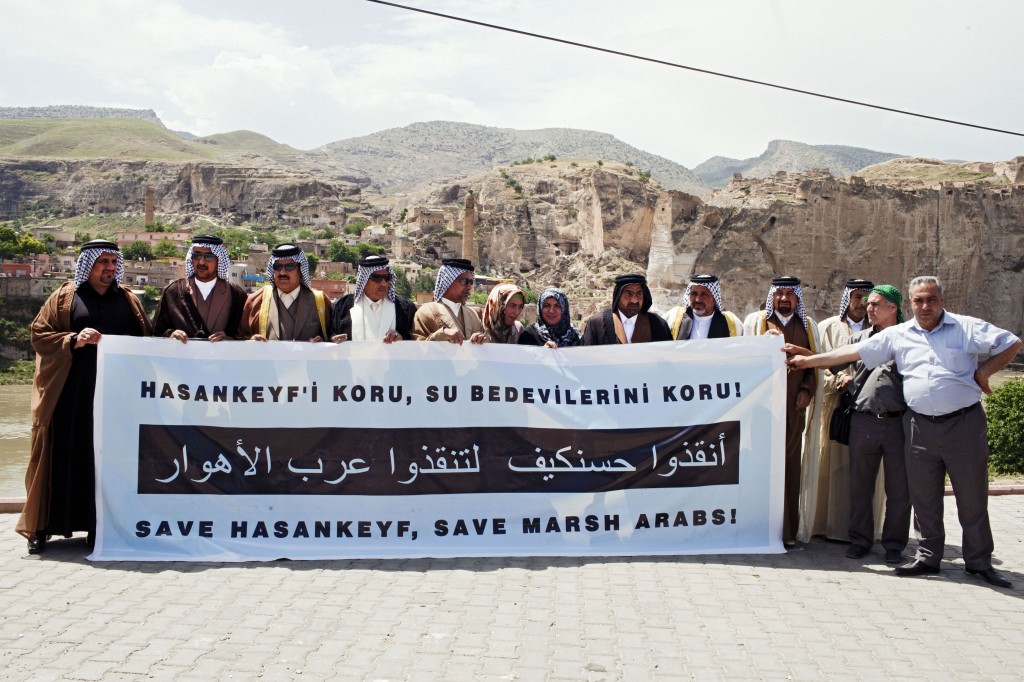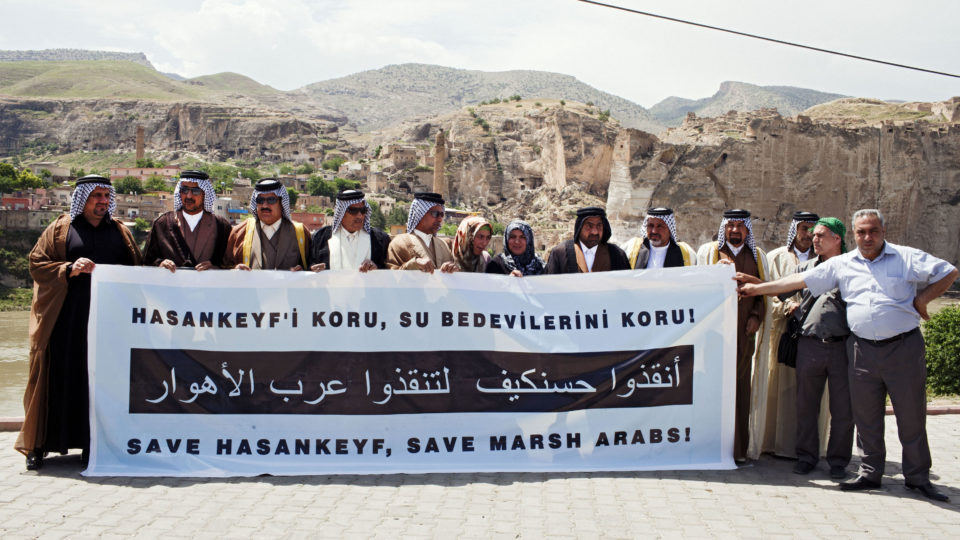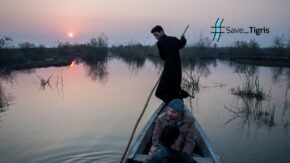Marsh Arabs protest Ilisu Project in Hasankeyf عرب الاهوار يحتجون ضد مشروع اليسو في “حسن كيف”
Cradle of Civilization at Risk of Desertification – Tigris Declaration sent to UN Hasankeyf, Turkey, May 22, 2012 “We have come from Iraq to speak, because no one came from Iraq to speak to us. We live in one of the most significant regions in the world – the Mesopotamian marshlands – which is in danger because of Ilisu.” With these words, Sheik Sayed Abbas began today’s unique protest in the Turkish cliff side city of Hasankeyf. He has come to the region with eight other tribal leaders to speak out against Ilisu. Together with the people of Hasankeyf, ECA Watch Austria, Nature Iraq, and the Turkish environmental group Doga Dernegi, these community leaders will sign the “Declaration Tigris,” which urges the United Nations Environment Programme (UNEP) to assist in the fight against Ilisu.”The impact of Ilisu will be far greater than previously thought. We hope that the UN will bring Turkey and Iraq to the negotiating table. Otherwise, the cradle of civilizations will become a desert, “says Ulrich Eichelmann of ECA Watch Austria.  If the construction of Ilisu is completed as planned, there will be devastating consequences upwards of 1,000 kilometers downstream of the dam. The dam will hold back the water that the marshes and their inhabitants need desperately, especially the spring floods that feed the flood plains near Basra. Whatever water makes it to the marshes will be reduced to a dirty trickle. Over the years of debate about Ilisu, the consequences for this area were ignored. This changes now. The Marsh Arabs are the inhabitants of the most important cultural landscape in the world, the Mesopotamian marshes in southern Iraq. At the confluence of the Euphrates and Tigris, the Sumerians developed the first writing, the first laws and the principles of ou ragriculture over 6,000 years ago. This area must have been the Garden of Eden. Abraham, the father of Judaism, Christianity and Islam may have been born in the nearby city of Ur. Despite numerous interventions, an irreplacable landscape in which people live as as they have for time out of memory: sleeping in reed houses, fishing, hunting, and raising water buffalo. “We are people of Mesopotamia, we are connected across the Tigris. This river is our common roots, our lifeblood and our future. We will fight together,” said Sheik Sayed Abbas. He concluded with a simple suggestion:”If we reduced the height of the dam from 130 meters to 65 meters, this would not flood Hasankeyf, and our marshes would not dry out.” – 65 meters for the cradle of humanity. Is this too much to ask? Further Information: Ulrich Eichelmann (ECA Watch Austria): ulrich.eichelmann@eca-watch.at 0043 676 6621512 Pictures from today’s meeting in Hasankeyf and from the Mesopotamian Marshes: http://m-h-s.org/ilisu/front_content.php?idart=772 The Mesopotamian Tigris Declaration: http://m-h-s.org/ilisu/upload/PDF/2012/The_Mesopotamian_Tigris_Declaration.pdf Take Action to Stop the Ilisu Dam! Sign this petition: http://www.change.org/petitions/unesco-world-heritage-committee-save-world-heritage-on-the-tigris-river-in-mesopotamia
If the construction of Ilisu is completed as planned, there will be devastating consequences upwards of 1,000 kilometers downstream of the dam. The dam will hold back the water that the marshes and their inhabitants need desperately, especially the spring floods that feed the flood plains near Basra. Whatever water makes it to the marshes will be reduced to a dirty trickle. Over the years of debate about Ilisu, the consequences for this area were ignored. This changes now. The Marsh Arabs are the inhabitants of the most important cultural landscape in the world, the Mesopotamian marshes in southern Iraq. At the confluence of the Euphrates and Tigris, the Sumerians developed the first writing, the first laws and the principles of ou ragriculture over 6,000 years ago. This area must have been the Garden of Eden. Abraham, the father of Judaism, Christianity and Islam may have been born in the nearby city of Ur. Despite numerous interventions, an irreplacable landscape in which people live as as they have for time out of memory: sleeping in reed houses, fishing, hunting, and raising water buffalo. “We are people of Mesopotamia, we are connected across the Tigris. This river is our common roots, our lifeblood and our future. We will fight together,” said Sheik Sayed Abbas. He concluded with a simple suggestion:”If we reduced the height of the dam from 130 meters to 65 meters, this would not flood Hasankeyf, and our marshes would not dry out.” – 65 meters for the cradle of humanity. Is this too much to ask? Further Information: Ulrich Eichelmann (ECA Watch Austria): ulrich.eichelmann@eca-watch.at 0043 676 6621512 Pictures from today’s meeting in Hasankeyf and from the Mesopotamian Marshes: http://m-h-s.org/ilisu/front_content.php?idart=772 The Mesopotamian Tigris Declaration: http://m-h-s.org/ilisu/upload/PDF/2012/The_Mesopotamian_Tigris_Declaration.pdf Take Action to Stop the Ilisu Dam! Sign this petition: http://www.change.org/petitions/unesco-world-heritage-committee-save-world-heritage-on-the-tigris-river-in-mesopotamia
مهد الحضارات، يتعرض لخطر التصحر – اعلان دجلة الموجه للأمم المتحدة
حسن كيف، تركيا بتاريخ 22. -5- 2012/ الشيخ السعيد يقول “لقد اتينا من العراق لنتحدث ، لانه لم يسبق ان اتي احد من العراق ليمثلنا ويتكلم باسمنا حول هذه المشكلة الخطيرة. نحن نعيش في مناطق تعتبر الاكثر اهمية في العالم الا وهي اهوار وادي الرافدين، والتي هي الان في خطر نتيجة سد اليسو”.
بهذه الكلمات بدا الشيخ سيد عباس احتجاج فريد من نوعه في تركيا في منطقة تقع على حافة مدينة “حسن كيف”. لقد اتى هنا لكي يحتج مع ثمان من قادة عشائر المنطقة ليتكلموا عن خطر سد “اليسو”.
بالتعاون مع سكان مدينة “حسن كيف”، قامت المنظمات التالية: “ايكا ووتج” – النمسا، منظمة طبيعة العراق ، ومجموعة البيئة التركية، بترتيب زيارة شيوخ من عرب الاهوار حيث سيوقعون بتوقيع عريضة “اعلان دجلة” والذي يحث برنامج البيئة – الامم المتحدة UNEP لمساندة الاحتجاج ضد مشروع سد اليسو. يقول المتحدث باسم المنظمة النمساوية السيد ايشلمان “ان تاثير هذا السد سيكون اخطر حتى مما كنا نتصور. نأمل ان تنجح الامم المتحد في جلب الجانب العراقي والتركي على طاولة التفاوض. والا فان مهد الحضارات سيكون صحراء قاحلة”.
اذا ما تم اكمال بناء هذا السد كما هو مخطط، فانه سيكون هنالك نتائج مدمرة تصل الى 1,000 كم من الاراضي التي تنحدر بعد نهاية السد.
السد سيحتفظ بالمياه التي يحتاجها وبصورة ملحة اهالي تلك المنطقة والاهوار بشكل خاص، خصوصا تدفقات المياه في فصل الربيع والتي تغذي السهول وصولاً الى البصرة. وبشكل حتمي فان مياه الاهور ستتقلص وستتحول الى منطقة وشلة (ضحلة) وقذرة.
ان النقاشات الطويلة التي جرت لعدة سنوات حول النتائج المدمرة لهذا السد، تجاهلت للاسف الاثر الذي سيلحقه هذا السد على منطقة الاهوار. وهذا يجب ان يتغير الان .
 ان عرب الاهوار هم سكان احد اهم المناطق الغنية ثقافيا وعلى مستوى العالم اجمع والتي هي اهوار وادي الرافدين في جنوب العراق. فعند التقاء نهر دجلة والفرات، طور السومريين الاوائل الكتابة لأول مرة وشرعوا القوانين ومبادئ الزراعة لأكثر من 6.000 سنة مضت. فالمنطقة تعتبر جنة عدن ومكان سيدنا ابراهيم اب اليهود والمسيحيين والمسلمين، والذي وربما يكون قد ولد هنا بالقرب من مدينة اور. وعلى الرغم من التدخلات العديدة فان الاهوار مازالت ذلك المكان الفريد والذي يعيش سكانه كما كانوا يعيشون منذ الزمان القديم ، ينامون في بيوت مصنوعة من القصب ويصيدون السمك ويعيشون على الصيد وعلى تربية الجاموس .
ان عرب الاهوار هم سكان احد اهم المناطق الغنية ثقافيا وعلى مستوى العالم اجمع والتي هي اهوار وادي الرافدين في جنوب العراق. فعند التقاء نهر دجلة والفرات، طور السومريين الاوائل الكتابة لأول مرة وشرعوا القوانين ومبادئ الزراعة لأكثر من 6.000 سنة مضت. فالمنطقة تعتبر جنة عدن ومكان سيدنا ابراهيم اب اليهود والمسيحيين والمسلمين، والذي وربما يكون قد ولد هنا بالقرب من مدينة اور. وعلى الرغم من التدخلات العديدة فان الاهوار مازالت ذلك المكان الفريد والذي يعيش سكانه كما كانوا يعيشون منذ الزمان القديم ، ينامون في بيوت مصنوعة من القصب ويصيدون السمك ويعيشون على الصيد وعلى تربية الجاموس .
” نحن ابناء وادي الرافدين، يربطنا نهر دجلة. هذا النهر يمثل جذورنا المشتركة وحياتنا ومستقبلنا. سنقاتل معا من اجل حقنا في المياه”. هذا ما قاله الشيخ سيد عباس ، وختم باقتراح بسيط وهو ” انقاص ارتفاع السد من 130 م الى 65 ، هذا بدوره لن يغرق مدينة “حسن كيف” واهوارنا لن تجف ، نطلب فقط 65 م لمهد الحضارات والانسانية ، هل هذا كثير ؟
لمزيد من المعلومات:
Ulrich Eichelmann (ECA Watch Austria): ulrich.eichelmann@eca-watch.at 0043 676 6621512 Pictures from today’s meeting in Hasankeyf and from the Mesopotamian Marshes: http://m-h-s.org/ilisu/front_content.php?idart=772
The Mesopotamian Tigris Declaration: http://m-h-s.org/ilisu/upload/PDF/2012/The_Mesopotamian_Tigris_Declaration.pdf





